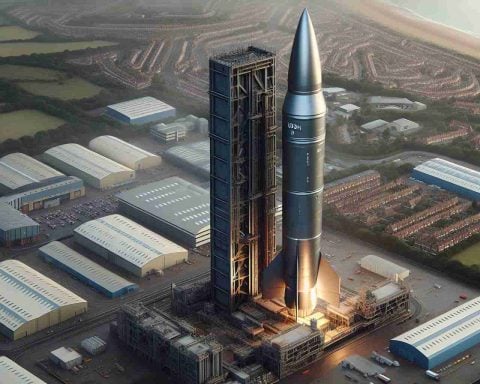A dramatic engine test at Japan’s Tanegashima Space Center erupted into chaos when a large fire broke out involving the Epsilon S rocket, an occurrence that has grounded Japan’s space endeavors. The unexpected blaze necessitated an immediate shutdown of operations at the southern Japanese facility.
The incident unfolded dramatically, with flames and heavy smoke seen on national television, underscoring the magnitude of the situation. Reports from journalists located roughly a kilometer from the site described hearing a significant explosion shortly after the test kicked off at 8:30 a.m. The fiery spectacle was captured by NHK, displaying a towering inferno and dense, white fumes enveloping the area.
Thankfully, officials confirmed that no injuries resulted from the fiery disruption. However, the cause of the incident remains a mystery, prompting an imminent investigation to uncover the root of the problem. Chief Cabinet Secretary Yoshimasa Hayashi emphasized the importance of resolving this issue, as the development of flagship rockets is vital for Japan’s autonomous space exploration aspirations.
Troublingly, this setback casts doubts on JAXA’s timeline for the Epsilon S launch, originally slated for March 2025. The Asahi Shimbun newspaper expressed skepticism over meeting this deadline given the current circumstances. The challenge is further compounded by recent launch failures, including an incident in March involving a private company’s rocket.
Japan is now tasked with reassessing its protocols and redoubling efforts to ensure future success in its space program while safeguarding against further mishaps.
New Rocket Fire Incident Challenges the Future of Japan’s Space Ambitions
Japan’s recent rocket engine test gone awry at the Tanegashima Space Center has thrown a spotlight on the cutting-edge world of aerospace technology and the inherent risks involved. While the incident presents significant challenges, it also underscores the relentless pursuit of innovation that defines the modern era.
Impact on Humanity and Technology
The blaze involving the Epsilon S rocket engine poses a significant hurdle not just for Japan, but for global space exploration endeavors. Japan’s ambitions in space have been in alignment with major players like NASA and ESA, and setbacks like these affect international projects reliant on Japanese technology. With the world gradually moving towards more advanced, autonomous space operations, such incidents remind us of the fragility and complexity of such technologies.
Interesting Facts and Controversies
1. Complex Engineering: Rocket propulsion systems are among the most complex engineering feats, where even a minor glitch can lead to catastrophic failures. This recent event at Tanegashima adds to a long history of rocket-related incidents, each providing valuable insights for future developments.
2. National Pride vs. Global Collaboration: While Japan’s space program is a source of national pride, it is also part of a broader network of global space exploration efforts. The question arises as to whether a nation should prioritize domestic advancements or focus on international collaboration.
3. Environment and Safety Concerns: Every rocket launch or test involves considerable environmental and human safety risks. Events like this recent fire bring to the forefront discussions on the balance between technological advancements and environmental stewardship.
Advantages and Disadvantages
Advantages:
– Technological Advancement: Incidents like these drive advancements in engineering, leading to more robust and resilient designs.
– Learning Opportunities: Failures pave the way for better understanding and improved safety measures for future endeavors.
Disadvantages:
– Resource Allocation: Setbacks are costly, both financially and in terms of delaying progress. With limited budgets, even a single incident can have a ripple effect on an entire space program.
– Public and Investor Confidence: High-profile failures can undermine the confidence of stakeholders, which is crucial for sustained investments in space exploration.
Related Questions and Answers
– Will Japan be able to meet its space exploration goals?
While the timeline might be affected, Japan’s commitment to excellence in space technology suggests that, with redesigned protocols and safety measures, eventually, the country’s goals can be met.
– What are key focus areas for preventing future incidents?
Enhancing safety protocols, incorporating advanced predictive maintenance technologies, and fostering open international collaborations for sharing risk strategies are vital.
For more on Japan’s advances in space technology and global collaborations, visit JAXA.
As Japan navigates this challenging episode, the outcome will likely be not just a technological reckoning, but also an opportunity for strategic improvements that could shape the future of space exploration.


















